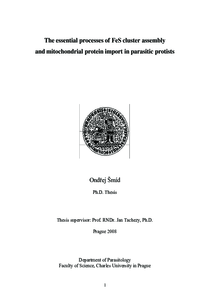The essential processes of FeS cluster assembly and mitochondrial protein import in parasitic protists
rigorózní práce (UZNÁNO)

Zobrazit/
Trvalý odkaz
http://hdl.handle.net/20.500.11956/92885Identifikátory
SIS: 176158
Katalog UK: 990021596100106986
Kolekce
- Kvalifikační práce [21514]
Autor
Fakulta / součást
Přírodovědecká fakulta
Obor
Parazitologie
Katedra / ústav / klinika
Katedra parazitologie
Datum obhajoby
27. 4. 2009
Nakladatel
Univerzita Karlova, Přírodovědecká fakultaJazyk
Angličtina
Známka
Uznáno
CONCLUSIONS Mitochondria appear to be vital organelles for all eukaryotic organisms known to date. A large body of evidence strongly indicates that hydrogenosomes and mitosomes, the organelles of anaerobic or intracellular parasitic protists lacking the "typical" mitochondria, are only a variation on the mitochondrial theme. However, even though the three organelles are evolutionarily the same entity, remarkable differences exist between them that reflect the adaptation of the organisms to their specific niches. In the thesis I tried to unravel some aspects of the essential mitochondrial processes of FeS cluster assembly and mitochondrial protein import in parasitic protists T. brucei and G. intestinalis. We investigated the function of the T. brucei cysteine desulfurase IscS and the scaffold protein IscU. We demonstrated that the two proteins are essential for FeS cluster formation and consequently the viability of the procyclic stage of T. brucei. Even though both IscS and IscU were specifically localized to the mitochondrion, their deficient expression affected the maturation of FeS proteins operating not only in the mitochondrion, but also in the cytosol. This indicates that a crucial part of FeS cluster assembly is localized to the mitochondrion of T. brucei. One of the major differences between the T....
